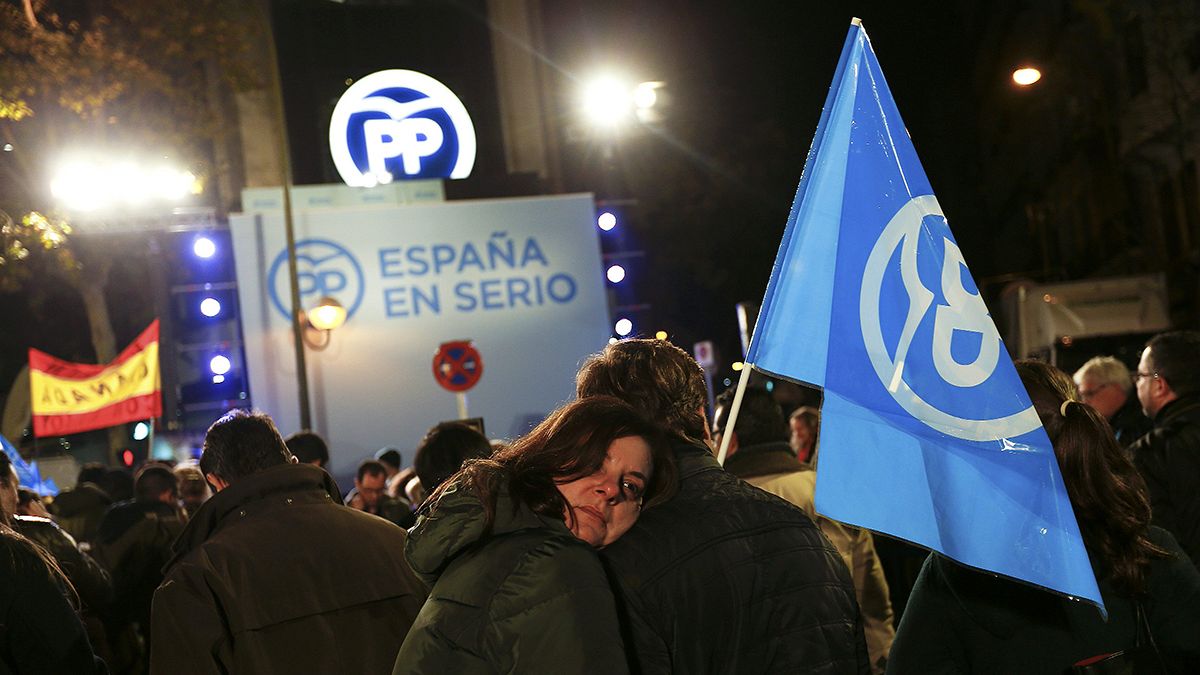The PP won the Spanish election, but appears unable to form a majority government. For the first time since the restoration of democracy, no-one can. Could a "loser's coalition" take over, or will we
It was a win for Spain’s People’s party, but not a big enough one. Outgoing Prime Minister Mariano Rajoy fell a long way short of an absolute majority, winning only 123 out of 350 seats.
On the left the Socialists won 90 seats, and further to the left Podemos won 69. The centre-right Ciudadanos snaffled 40.
Rajoy’s chance of forming a stable new government appear slim. He will have to negotiate with at least two other parties, and probably all of them, with their diametrically opposed ideologies, and little or no room to manoeuvre. Mission impossible?
“My friends, I’ll will try to form government and I believe Spain needs a stable government,” said a defiant Rajoy.
There are many possible scenarios, all of them complex. Here are just a few.
The only possible absolute majority is a grand left-right coalition with the Socialists. But that has never happened before in Spain. Several analysts warn the Socialists such a move would be suicide come the next election.
Rajoy could try to enlist Ciudadanos, which has already said it will abstain rather than oppose a PP minority government.
There could also be an alliance of the leftist parties, but again, it would be a minority administration.
The third biggest party, Podemos, has already laid down some “red lines” which leader Pablo Iglesias will base his talks on. They include radical constitutional reform, restructuring the public debt, a referendum in Catalunya, and ring-fenced education and heath budgets.
“Our defence of social justice, and our fight against corruption are going to be the political lines of our group in the Spanish congress. Spain is not going to be the same anymore. We are very happy and now the agenda is the constitutional reform in our country,” said Iglesias.
Podemos is now a force to be reckoned with in parliament. Albert Rivera’s Ciudadanos will be as well. The balance of power is complicated. Is a minority government feasible? Is it even possible to govern Spain with this new deal?
Political analyst Fernando Vallespin outlines Spain’s post-election options
Carlos Marlasca, euronews:
“A parliament divided between the right and left is the result of Sunday’s Spanish election according to Fernando Vallespín, Professor of Political Science at Madrid Free University. It is a result that expresses Spanish society’s desire for democratic regeneration, but it makes the job of forming a new Rajoy-led government very difficult, does it not?”
Fernando Vallespin:
“I think the most viable option is for the PP to dump Rajoy as leader and present a programme with four or five concessions so that the Socialists abstain and let a minority government work. But that will still be a government that’s terribly unstable that could collapse at any moment. It could involve opening a Congressional constitutional reform commission that will end up with a Constituent Assembly in a year or 18 months time, maybe a little more”.
euronews:
“Taking into account the composition of the new parliament and each party’s demands, should we be getting ready for new elections?”
Fernando Vallespin:
“Obviously it’s entirely possible we could have another election in two or four months time. A new government has to be formed in two months, otherwise we go to the polls again.
Who would win? I have no idea, it depends how each party reacts. I think any party that refuses to compromise in this coalition-negotiation period will be penalised. People want their politicians to be able to make pacts, and that’s confirmed in opinion polls. Curiously the preferred option would be a Socialist-Podemos coalition, but the numbers don’t add up, and it appears doubtful they would be able to agree on the essential points.”
euronews:
“The outgoing parliament approved the 2016 budget, but could the political shakeup slow the economic recovery?”
Fernando Vallespin:
“I believe that Spanish society over the last few years has found a way to renew itself in all domains, including the economic one. It is a fragile regeneration and I think the first priority is to re-establish the social cohesion that was shattered by the banking crisis. Many people are suffering, and that has to be the priority, but to tackle that we need resources and economic growth. At the moment the government is in office for two more months, and while it searches for a new executive, the state apparatus continues to function.”
